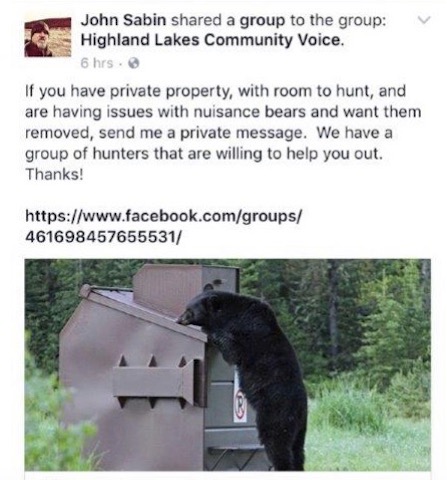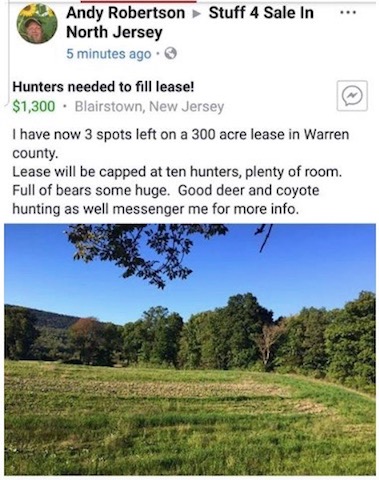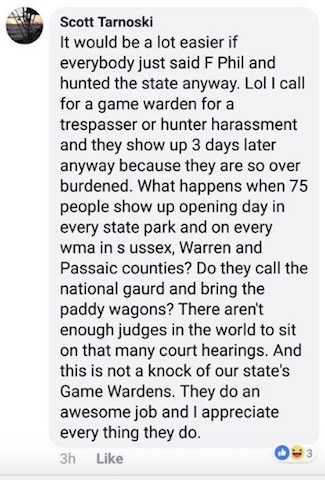Fish and Game Council “independence constrained” – “subjugation to DEP authority”
DEP approval is a “condition precedent” to the Council’s pursuit of a hunt
Statements By Gov. Murphy & DEP Commissioner McCabe Are Flat Out False
In the event that comprehensive policies are agreed on and a dispute arises between the Commissioner and the Fish and Game Council over whether a hunt or any other preservation or propagation methodology is justified, the [DEP’s] comprehensive policies will provide the standard for adjudicating the issue. ~~~ NJ Supreme Court
Statements by Gov. Murphy – including provisions of his Executive Order #34 – and the Legislative testimony of his DEP Commissioner Catherine McCabe regarding their alleged lack of power to over-rule the Fish and Game Council and block the black bear hunt are flat out false and directly contradict the NJ Supreme Court’s ruling on that very issue.
I want to be very clear here, so let’s break this down.
First we will restate the Governor’s statements – which as I previously wrote are echoed in the text of Executive Order #34. Next, we will excerpt text from the Supreme Court’s ruling that applies to each statement.
We will do the same thing for DEP Commissioner McCabe’s testimony to the Senate Budget Committee last May in response to a direct question by Senator Greenstein:
Greenstein question: “Will the DEP uphold Governor Murphy’s commitment to stopping the bear hunt this year and to look at nonlethal methods for bear control?”
McCabe response: “The legal authority for controlling the bear hunt resides, as you may know, with the Fish and Game Council and we have consulted with the Attorney General and advised the Governor’s Office of that. …. In order to change that [the hunt], we would have to go back to the Game Council and provide some evidence of why a different arrangement, or the science would argue for reducing the amount of hunting or eliminating the hunting. “ (listen to testimony)
Apparently based on Commissioner McCabe’s recommendation, the Governor made 3 claims, all of them false, as follows:
1) the Fish and Game Council is in exclusively charge of the bear hunt:
“[The Council] has the sole authority to authorize a bear hunt.”
2) the Governor has no power to cancel the hunt:
“Pursuant to a New Jersey Supreme Court decision in 2005 and other related court decisions, if the council recommends a bear hunt and properly adopts regulations implementing a hunt, the governor does not have the ability to unilaterally cancel it,”
3) the Legislature must act:
“In order for the hunt to be stopped, either the Legislature must act or the council must adopt new regulations that do not include provisions for the hunt.”
4) The Governor’s statement also is false by material omission, because he failed to mention the powers of his DEP authorized by the Legislature and upheld by the Supreme Court. It is also false and misleading by stating that the Supreme Court somehow limited the Governor’s powers regarding the hunt. However, the Court said nothing about the powers of the Governor.
5) McCabe’s testimony is false and misleading. It is false by material omission regarding what the Court found regarding DEP’s power over the Fish and Game Council.
It is misleading by conflating “science” with the DEP’s “comprehensive conservation policy” powers that the Court upheld. As McCabe – a lawyer and former US EPA Environmental Appeals Board Judge – surely knows, DEP “policy” is a far broader power and administrative enterprise than “science”.
6) The Gov.’s. statement also badly mis-states the law and his Executive Order violates the NJ Constitution’s separation of powers and raises “non-delegation doctrine” issues.
The Gov. claims that he lacks Executive power to over-ride the Fish and Game Council. Let’s examine that claim in light of some basics.
The Fish and Game Council was created by the Legislature and, as the Supreme Court ruled, is subject (the Court used the term “subjugation”) to DEP authority discharged by the DEP Commissioner. The DEP is an executive branch agency and the Commissioner is nominated by, confirmed by the Senate and serves at the pleasure of the Governor. The Gov. may not direct the DEP Commissioner to violate the law, but he can direct the DEP Commissioner to implement public policy that is in the public interest, as authorized by the Legislature ad upheld by the Supreme Court.
The Council, after approval by Gov. Christie’s DEP Commissioner Bob Martin, adopted a “Comprehensive Black Bear Management Plan” via regulation in August 2010 which included a hunt. That CBBMP was updated, expanded, and renewed via regulation in October 2015.
The updated CBBMP regulation expires and is in effect until 2021.
Regardless of the expiration date, no administrative agency has the power to legally and irreversibly bind a future administration.
To do so would grant the Fish and Game Council legislative powers because the Christie DEP and F&G Council would be binding a new Governor and DEP.
That is a violation of the separation of powers embodied in the NJ Constitution.
It also could be a violation of the “non-delegation doctrine”, by delegating DEP’s superior conservation policy powers to the F&G Council.
Additionally, it violates Constitutional “anti-entrenchment” principles. By analogy, it is well settled law that “one legislature may not bind the legislative authority of its successors” (UNITED STATES, PETITIONER v. WINSTAR CORPORATION et al.) A similar principle holds, but for different reasons, to the Executive branch.
The DEP has the authority delegated by the Legislature to propose, adopt, amend, and repeal regulations. The CBBMP is implemented via a regulation and amendment to DEP Game Code. DEP, as recognized by the Supreme Court, has exclusive power to adopt “conservation policies” that bind the Fish and Game Council and govern the the black bear population and the management thereof.
Contrary to what DEP Commissioner McCabe claims, the DEP does not have to “go back” to the Fish and Game Council to get their approval of regulations to amend regulations.
The Murphy DEP could adopt statewide “conservation policies” via regulation and/or simply amend or repeal the current Christie DEP Game Code regulations that govern the bear hunt to eliminate hunting as a management tool and instead rely on non-lethal management methods. That regulatory policy change does not need to be based exclusively on “science”, as recognized by the court who upheld DEP’s “conservation policy” powers.
The Supreme Court ruled that when there is conflict between DEP policies and the Fish and Game Council, then DEP supersedes the Council:
In the event that comprehensive policies are agreed on and a dispute arises between the Commissioner and the Fish and Game Council over whether a hunt or any other preservation or propagation methodology is justified, the comprehensive policies will provide the standard for adjudicating the issue.
The DEP could adopt regulatory policies via emergency rule making, which does not require public notice, hearings and comment prior to adoption. So there is time to do this before the planned December hunt.
The Governor also has broad executive powers – including emergency powers – to stop the hunt and direct DEP to act.
Obviously, Governors have the power to change administrative policy. That’s what elections are all about.
The NJ Governor, constitutionally, has perhaps the most powerful Executive branch power of any Governor in the country. But we won’t go into those powers today. Let’s just say it is ludicrous to argue that an “in but not of” Council, comprised of private self interested hunters and farmers who promote hunting, has power dictate policy to and to over-rule the DEP Commissioner, never mind the Governor.
And I have not even mentioned the Governor and DEP’s powers under Public Trust common law doctrine.
We have a long standing problem in mischaracterizing the Supreme Court’s ruling. Interestingly, the Christie DEP totally misrepresented the Supreme Court’s decision in the public notice of the proposed rule to the updated CBBMP, which claimed:
Five years ago, the Council created the CBBMP in response to a New Jersey Supreme Court opinion in which the Court stated that the Department of Environmental Protection (Department) could not cancel a hunt authorized by the Council, but that the Council could not authorize a hunt absent a comprehensive management policy.
As we explain, there is nothing explicit or implicit in the Supreme Courts decision that says “the Court stated that the Department of Environmental Protection (Department) could not cancel a hunt authorized by the Council“. The court did not “state” that.
So now let me explain exactly how these 6 statements noted above are false and provide the Supreme Court’s text to back that up.
In the 2005 case the Gov. refers to, named : U.S. SPORTSMEN’S ALLIANCE FOUNDATION; v. NEW JERSEY DEPARTMENT OF ENVIRONMENTAL PROTECTION, the NJ Supreme Court issued an opinion regarding the legal powers of the Department of Environmental Protection and the Fish and Game Council with respect to the management of black bears, specifically including control of the bear hunt.
In a slam dunk decision with no wiggle room – the Court described its ruling as “ineluctable” – the Court found the exact opposite of the Governor’s statements.
Directly contradicting the Gov. and DEP Commissioner’s claims, the Court ruled that:
1) DEP is in control of statewide conservation policies ;
2) that DEP approval is a “condition precedent” of the Council’s ability to authorize a bear hunt; and
3) that the while the Fish and Game Council has shared powers, they are subordinate to DEP, the agency solely responsible for what the Court said was “ a unified approach to conservation and environmental protection under the authority of the Commissioner.”
Here is the applicable text of the Court’s opinion:
the Fish and Game Council’s ability to authorize a bear hunt is subject to the statutory condition precedent of the Commissioner’s earlier approval of the very comprehensive policies governing the propagation of black bears.
Our conclusion regarding the Commissioner’s authority is ineluctable not only because of the approval language but because the entire statutory scheme was intended to create a unified approach to conservation and environmental protection under the authority of the Commissioner. Although the Fish and Game Council may act without day-to-day veto by the Commissioner, its actions exist within a larger universe of comprehensive environmental policies. If it does not act in accord with those policies, the Commissioner is empowered to intervene.
Note how the Court upheld “a unified approach to conservation and environmental protection under the authority of the Commissioner”. Gov. Murphy’s Executive Order #34 contradicts that “uniform approach” the Court found, by establishing different hunting restrictions on public lands versus private lands. That error alone should lead to a lawsuit that invalidates the EO.
Note also that the Court recognized that DEP is “empowered to intervene” if the F&G Council “does not act in accord with those policies” (“uniform” “comprehensive” policies).
So, contrary to Commissioner McCabe’s claims, DEP can intervene and over-ride the Council.
But more importantly, in fact, the Supreme Court explicitly rejected the views of Gov. Murphy and McCabe that DEP’s powers are limited and the Fish and Game Council is solely in charge of the hunt.
Specifically, the Supreme Court case was an appeal by the DEP of an adverse Appellate Court ruling.
The Supreme Court sided with DEP and reversed a prior Appellate Court opinion. DEP won the appeal. The Appellate Division ruling the the Supreme Court reversed had found:
The Appellate Division held that the Commissioner lacks the statutory authority to enjoin the issuance of bear hunt permits or to otherwise interfere with Fish and Game Code regulations governing the hunt.
The Supreme Court ruled that:
The judgment of the Appellate Division is reversed.
The Supreme Court laid out a detailed historical and rigorous legal analysis regarding the relative powers of DEP and the Fish and Game Council, going back over 70 years.
And in issuing the opinion, the Supreme Court’s decision used incredibly clear and decisive language, describing their opinion as “ineluctable” – or in layman’s terms, a slam dunk, ironclad, no wiggle room opinion.
“Ineluctable” is defined as follows:
unable to be resisted or avoided; inescapable.
It is shocking that the DEP Commissioner somehow interpreted that 2005 “ineluctable” Supreme Court decision to mean the exact opposite of what the court actually ruled. Did she even read it? Or was she buffaloed by the DEP DFW hacks who serve the Fish and Game Council?
The legal error are so egregious, it is akin to arguing that in the Brown V. Board decision, the US Supreme Court put White Citizens Councils or the KKK in charge of desegregating schools.
Leads me to think that continuation of the bear hunt was a concession Senate President Sweeney extracted for McCabe’s confirmation.
In our next post, will will lay out exactly how the Governor and the DEP can and should act to stop the hunt and reign in the Fish and Game Council.





